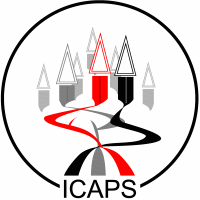|
|
Invited Talks
Advanced Research with Autonomous Unmanned Aerial Vehicles
Patrick Doherty (Joint talk with KR)
Artificial Intelligence Meets Operations Research:
a Constraint Programmer's Point of View
Michela Milano
Planning for an Uncertain Future
Reid Simmons
Artificial Intelligence Meets Operations Research:
a Constraint Programmer's Point of View
Michela Milano
The talk will focus on two well known and widely used methods for
solving combinatorial optimization problems in general and scheduling
and planning problems in particular: Constraint Programming, coming
mainly from the Artificial Intelligence (AI) community, and Integer
Programming, developed in the Operations Research (OR) community.
The two paradigms differ in some features and share others. They have
been used separately and have only recently been merged, obtaining
promising results. The talk will try to bridge the gap between OR and
AI approaches to planning and scheduling, explaining when OR
approaches work well and when they fail, and how approaches from AI
and OR might be helpful to each other. The talk will also outline some
successful hybrid approaches, mainly in the field of scheduling.
Michela Milano obtained her master's degree from the University of
Bologna in March 1994. She received her Ph.D. in 1998 from the
University of Bologna and is now an associate professor at the same
university. Her research activity focuses on the integration of
constraint and integer programming. She is the editor of a recent book
the topic, published by Kluwer. She organized the First International
Workshop on the Integration of AI and OR techniques in Constraint
Programming in February 1999 and the first International School on
Optimization in April 2001. She is the guest editor of a special issue
of the Journal of Heuristics on "Integration of AI and OR techniques
in Constraint Programming." She is also an associate editor of the
INFORMS Journal of Computing in the area of logic, optimization and
constraint programming.
Advanced Research with Autonomous Unmanned Aerial Vehicles
Patrick Doherty
The emerging area of intelligent unmanned aerial vehicle (UAV)
research has shown rapid development in recent years and offers a
great number of research challenges for artificial intelligence and
knowledge representation. For both military and civilian applications,
there is a desire to develop more sophisticated UAV platforms where
the emphasis is placed on intelligent capabilities and their
integration in complex distributed software architectures. Such
architectures should support the integration of deliberative, reactive
and control functionalities in addition to the UAV's integration with
larger network centric systems.
In my talk I will present some of the research and results from a long
term basic research project with UAVs currently being pursued at
Linköping University, Sweden. The talk will focus on knowledge
representation techniques used in the project and the support for
these techniques provided by the software architecture developed for
our UAV platform, a Yamaha RMAX helicopter. Additional focus will be
placed on some of the planning and execution monitoring functionality
developed for our applications in the areas of traffic monitoring,
surveying and photogrammetry and emergency services assistance.
Patrick Doherty is a professor of computer science at the Department
of Computer and Information Science (IDA), Linköping University,
Sweden. He is the director of the Artificial Intelligence and
Integrated Computer Systems Division at IDA and head of the Knowledge
Processing Laboratory. He is also President of the Swedish Artificial
Intelligence Society. His current research interests include formal
knowledge representation and approximate reasoning, automated
planning, reasoning about action and change, autonomous aerial
robotics systems, and software architectures for autonomous systems.
Planning for an Uncertain Future
Reid Simmons
Robots and planning have a long history, going back to the days of
Shakey and STRIPS. However, many of the representations and
techniques historically used for planning are not appropriate given
the real-time constraints and uncertainty in sensing, action and
modeling that are associated with many robotics domains. Instead,
autonomous robots need representations that can deal with the
uncertainty and search techniques that are both efficient and robust.
This talk will focus on general approaches that have been used
successfully in planning for autonomous robots. These include use of
probabilistic representations, incremental planning and scheduling
techniques, and sample-based (stochastic) methods. Architectures that
integrate planning and execution will be surveyed to illustrate how
these approaches can be used to reliably control autonomous mobile
robots. In addition, gratuitous videos will be shown of robots in
action.
Reid Gordon Simmons is a Research Professor in the School of Computer
at Carnegie Mellon University. He earned his B.A. degree in 1979 in
Computer Science from SUNY at Buffalo, and his M.S. and Ph.D. degrees
from MIT in 1983 and 1988, respectively, in the field of Artificial
Intelligence. His thesis work focused on the combination of
associational and causal reasoning for planning and interpretation
tasks. The research analyzed the relationships between different
aspects of expertise and developed a domain-independent theory of
debugging faulty plans. Since coming to Carnegie Mellon in 1988,
Dr. Simmons' research has focused on developing self-reliant robots
that can autonomously operate over extended periods of time in
unknown, unstructured environments. This work involves issues of
robot control architectures that combine deliberative and reactive
control, probabilistic planning and reasoning, monitoring and fault
detection, and robust indoor and outdoor navigation. More recently,
Dr. Simmons has focused on the areas of coordination of multiple
heterogeneous robots, human-robot social interaction, and formal
verification of autonomous systems. Over the years, he has been
involved in the development of over a dozen autonomous robots.
|
|
